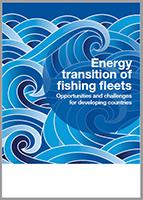
The fisheries sector is important for food security, jobs and for the livelihoods of millions of people, especially in developing countries.
Fishing fleets are a key contributor to the fisheries and seafood value chain, but also an important source of GHG emissions because they rely on fossil fuels such as marine diesel as a source of energy.
This study aims to provide a first mapping of the main challenges and opportunities of the energy transition of fishing vessels for developing countries.
To do that, the study explores the interface between climate change, CO2 emissions and fishing fleets by analysing emissions data and ocean and fisheries commitments in NDCs under the Paris Agreement.
It also analyses the incipient regulatory framework for emissions from fishing fleets, fuels used and fisheries subsidies under IMO and WTO.
Additionally, it reviews the ways in which energy efficiency and efforts towards decarbonization are starting to be approached at the national and regional level in selected case studies.
The study identifies the different technological options that are commercially available, or in the R&D phase, to enable such a transition and assesses their implications.
The study is limited to the activity of fishing vessels from pre-harvesting to landing, including related port infrastructure. Fishing is an extractive sector and most emissions stem from the fuels that are used to propel the fishing vessels, but fuel is also used for processing fish on board vessels.
Moreover, the fuel used in fishing vessels is often diesel or other forms of bunker fuel or heavy fuel oil (HFO), which contains more contaminants than regular fuel and is therefore more polluting.
The study provides a set of key economic, technological, trade, environmental and social recommendations to support a just energy transition for fishing fleets, particularly in developing countries.
A complete analysis of the energy transition of the fisheries sector, including a review of the entire fisheries value chain, sustainable fisheries and ecosystems management, is beyond the scope of this initial study and could be the subject of future research.


